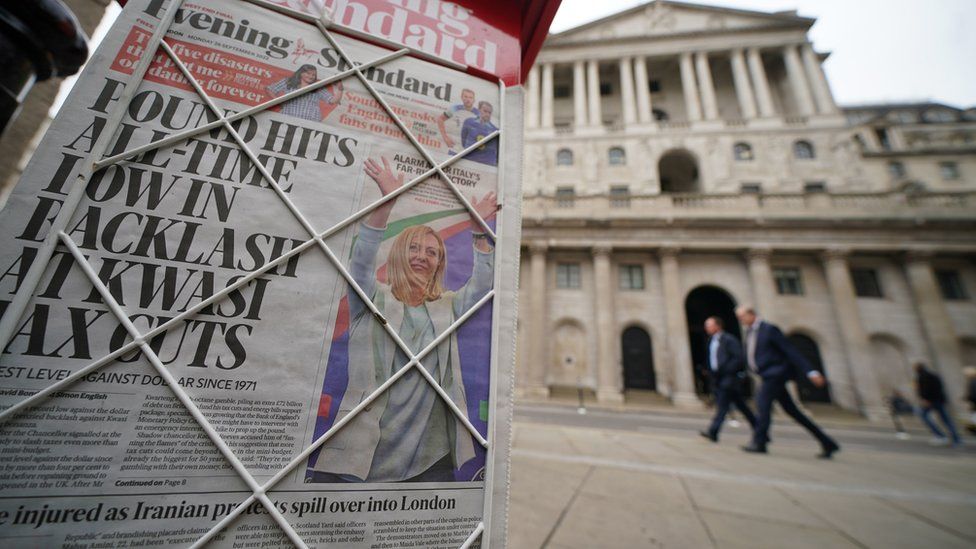Tax cuts are right plan for economy, says Liz Truss
BBC Local Radio #BBCLocalRadio

Media caption,
Liz Truss: It’s not fair to have a recession
Liz Truss has insisted tax cuts outlined in the mini-budget are the “right plan”, despite market turmoil since they were announced last week.
The prime minister insisted “urgent action” had been required to grow the economy, and the cuts would help boost growth in the long term.
She added she was “prepared to do what it takes to make that happen”.
Labour has called for the measures to be abandoned to restore market confidence.
But in her first public comments since the cuts to income tax were announced by the chancellor, Ms Truss said she was prepared to take “controversial and difficult decisions”.
In a series of testy interviews with BBC local radio stations, she insisted that “currencies are under pressure around the world,” and blamed Russia’s invasion of Ukraine for economic turbulence globally.
Last week’s £45bn tax-cutting package, funded by more public borrowing, has sparked a fall in the pound and a surge in borrowing costs.
The market reaction has prompted the Bank of England to step in and buy £65bn of government debt to stop some pension funds collapsing.
Asked about the reaction to the cuts, Ms Truss said the UK had the highest tax burden in 70 years and cuts were needed to stave off an economic slump.
And questioned about the fairness of the measures, which includes scrapping the 45p income tax band for top earners, the prime minister replied: “It’s not fair to have a recession.”
She added there was “plenty of evidence” that reducing the tax burden would boost economic growth.
The cost of public borrowing edged higher after the PM said she would stick with her plan, with the interest paid on 10-year government debt rising.
The pound continues to flutter around $1.08, a recovery on recent days but still weak.
![]()

Eight different interviews with eight different personalities within an hour – a punishing morning schedule for a prime minister who’s so far been silent this week amid the fallout of her government’s mini-Budget.
As presenter after presenter pressed her about the concerns of their listeners, Liz Truss tried to remain composed as she defended her economic approach but at times she lapsed into uncomfortable laughter and there were a number of awkward pauses.
She wanted to focus attention away from tax cuts and on to the energy bill support package – insisting growth would follow, albeit she admitted not overnight.
There was a difficult encounter over fracking with BBC Radio Lancashire, but the prime minister was mainly under pressure over the economy.
She had few words of reassurance for listeners with real worries now – instead her message was, it’s necessary and the situation will be better for all in the long run.
![]()

Image source, PA Media Image caption,
The pound hit a record low against the US dollar on Monday
After a record fall in the value of the pound against the dollar earlier this week, the government announced it would set out a plan to cut debt in the “medium term” on 23 November.
In a bid to reassure markets, the Treasury has also asked government departments to find savings.
The Bank of England has announced it will buy £65bn in government debt to calm markets and stop certain types of pension funds collapsing.
It has also said it is prepared to hike interest rates to tame inflation, a move which would push up monthly mortgage payments for millions of homeowners.
Speaking to BBC Breakfast, Chief Secretary to the Treasury Chris Philp confirmed that departments will have to stick to spending limits already set until 2025.
He also said the government would not be bringing forward its debt-cutting blueprint from late November, despite calls to do so from the opposition.
“It’s important to do this in a way that’s organised and orderly,” he told the programme.
He also said the time would allow the Office of Budget Responsibility the time to compile an assessment of the plans due to be published alongside the debt plan in November.
However, his Labour counterpart Pat McFadden said the tax cuts were a “reckless act of choice” that had “wreaked havoc” in the market and would push up mortgage rates.
“They’ve got to reconsider this. They’ve got to pause and think about what they’ve done,” he added.
“What’s more important here – the prime minister and the chancellor saving face, or saving the mortgage payments of millions of people?”
Parliament remains suspended for the party conference season, with MPs not due to return until 11 October.
Downing Street has rejected opposition calls for next week’s Conservative conference to be cancelled to allow an emergency recall.
The economic backdrop is set to dominate the four-day event in Birmingham, Ms Truss’s first since she took over as Tory leader earlier this month.
Chancellor Kwasi Kwarteng, who has not commented since the turmoil of recent days, is set to make a speech on Monday.